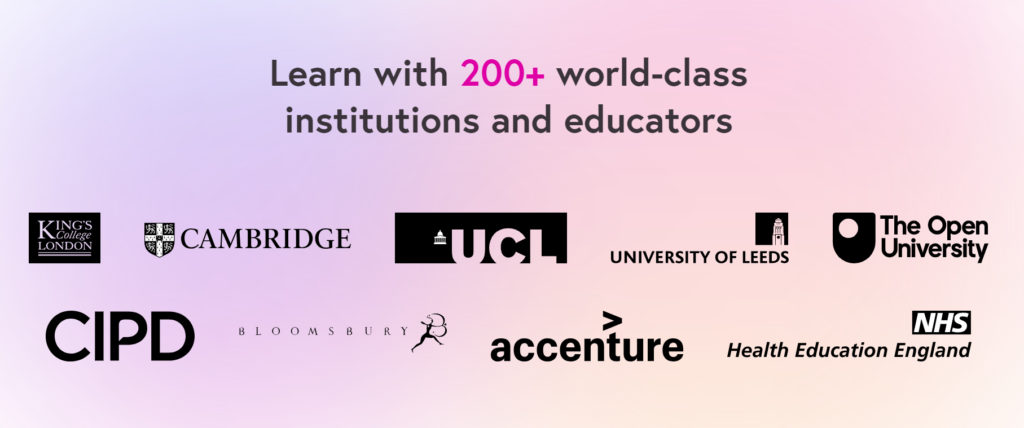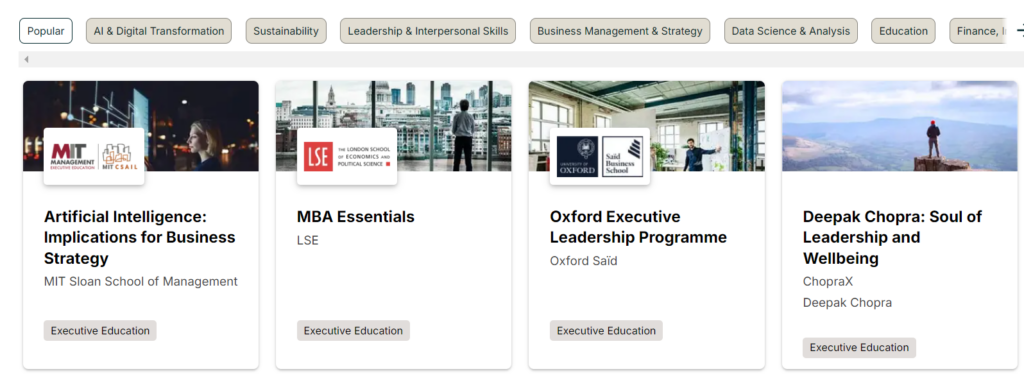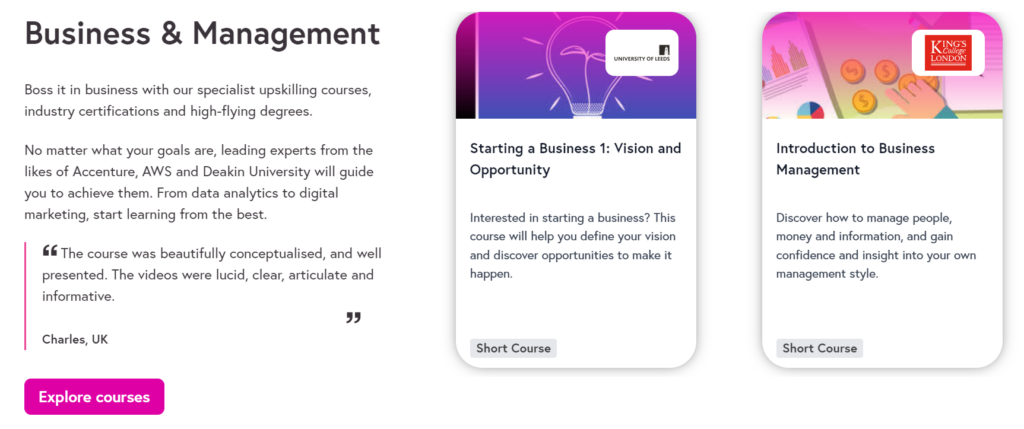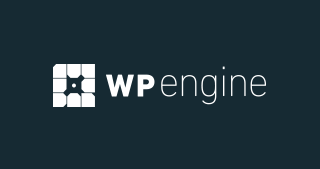Introduction
As the demand for online education continues to rise, numerous platforms have emerged, offering accessible learning opportunities for individuals across the globe. Among the leading contenders in the online education space are edX and FutureLearn. These platforms are popular for their high-quality courses, collaboration with top universities and organizations, and diverse learning formats. However, they differ in their approach to course delivery, pricing models, and target audiences.
In this comprehensive comparison, we will dive deep into the key aspects of edX and FutureLearn, from their features and pricing to the overall learning experience. Whether you’re seeking to advance your career or explore new topics, understanding the differences between these platforms will help you choose the best option for your needs.
Overview
Overview of edX
Founded in 2012 by Harvard University and MIT, edX is one of the most prestigious online learning platforms. As a non-profit organization, edX offers a wide range of courses in partnership with over 160 universities and institutions, including Harvard, MIT, Oxford, Berkeley, and Microsoft. With its mission to make education accessible to everyone, edX offers both free and paid courses that cover a diverse range of subjects like technology, business, healthcare, and the humanities.

edX is particularly known for its formal degree programs, MicroMasters, and professional certificates. Learners can audit courses for free or opt for paid versions that provide verified certificates. The platform is a go-to resource for students and professionals seeking university-level education and career development opportunities.
Overview of FutureLearn
Founded in 2013, FutureLearn is another prominent online education platform, established by The Open University in the UK. Like edX, FutureLearn collaborates with leading universities and institutions, including The University of London, King’s College London, and The British Council, to offer a wide range of courses. The platform’s focus is on providing accessible, social learning experiences across various subjects like education, healthcare, technology, and history.

FutureLearn emphasizes short courses, but it also offers more extensive programs, such as Microcredentials, ExpertTracks, and even full online degrees. Its unique feature is its focus on social learning, encouraging learners to participate in discussions and share ideas through interactive features. FutureLearn offers free access to many courses, with paid options for certificates, unlimited access, and additional assessments.
Features
1. Course Catalog and Variety
- edX: With over 3,000 courses, edX offers a broad range of subjects from computer science and engineering to business management, healthcare, and the humanities. edX’s extensive catalog makes it a popular choice for learners who want to gain both academic and practical knowledge. The platform also provides learners with various pathways to certification, including MicroMasters, Professional Certificates, and full Master’s degrees.
- FutureLearn: FutureLearn offers a wide variety of courses, focusing on topics like education, digital skills, history, psychology, and healthcare. The platform emphasizes shorter courses, many of which can be completed in a few weeks. FutureLearn also offers Microcredentials, ExpertTracks, and full degree programs in collaboration with universities. While FutureLearn’s catalog is smaller compared to edX, its curated offerings are well-regarded, especially in the fields of healthcare and social sciences.
2. Course Delivery Style
- edX: edX courses typically consist of video lectures, quizzes, graded assignments, and discussion forums. Many of the courses are self-paced, allowing learners to complete them according to their schedules. Some courses run on a fixed schedule, especially for degree programs. Learners who audit the courses for free can access materials but cannot submit assignments for grading unless they pay for the verified track.
- FutureLearn: FutureLearn courses emphasize social learning, encouraging discussions and collaboration among learners through integrated discussion features. Courses are often structured with weekly modules, each including video lessons, quizzes, and assignments. While many courses are self-paced, others follow a specific schedule, with new content released weekly. Learners can participate in discussions, sharing insights and answering questions, which adds a unique community-driven aspect to the learning experience.
3. Partnerships
- edX: edX has an impressive list of over 160 partnerships with world-renowned universities, such as Harvard, MIT, and Oxford, as well as leading companies like Microsoft and IBM. This collaboration ensures that edX courses are academically rigorous and industry-relevant. These partnerships also enable edX to offer formal degrees and certifications that are recognized globally.
- FutureLearn: FutureLearn also collaborates with top universities and institutions, including The Open University, The University of Edinburgh, and The British Council. In addition to universities, FutureLearn partners with organizations like UNESCO and Amnesty International, providing courses with a focus on social issues, human rights, and global challenges. While FutureLearn’s partnerships are strong, they are generally more focused on UK-based institutions compared to edX’s global partnerships.
4. Certification and Degrees
- edX: edX offers a variety of certifications, including verified certificates, Professional Certificates, MicroMasters, and full Master’s degrees. These credentials are often recognized by employers and academic institutions, and some can even be transferred as university credits toward degree programs. The flexibility of these certifications makes edX a preferred platform for professionals looking to advance their careers.
- FutureLearn: FutureLearn provides multiple certification options, such as Course Certificates, Microcredentials, ExpertTracks, and full online degrees. Microcredentials offer academic credit and are designed to help learners build job-specific skills. ExpertTracks are a series of courses focused on mastering a specific subject. FutureLearn also offers full degree programs in collaboration with universities, allowing learners to earn Bachelor’s and Master’s degrees online.
5. Learning Support
- edX: edX offers discussion forums where learners can engage with peers and instructors. For paid courses, learners have access to assignments, feedback, and graded exams. Support options are generally more formal, with academic advisors available for degree programs. However, peer interaction is primarily limited to discussion forums, with little emphasis on social learning.

- FutureLearn: One of FutureLearn’s standout features is its emphasis on social learning. Learners are encouraged to engage in discussions with fellow students, share ideas, and collaborate on learning activities. In addition to course materials, FutureLearn provides interactive elements, such as quizzes and case studies, to reinforce learning. This focus on peer-to-peer interaction makes learning more engaging, though it may not be as structured as edX’s support for formal assignments and exams.

Pricing
edX Pricing:
- Audit Option: Many edX courses can be audited for free. This gives learners access to course materials but without submitting assignments or receiving a certificate.
- Verified Certificates: Learners who want to receive a certificate must pay for the verified track, which typically costs between $50 and $300, depending on the course.
- MicroMasters & Professional Certificates: These programs usually range from $500 to $1,500 and can be used to earn university credits.
- Degree Programs: Full degree programs on edX, including Master’s degrees, can range from $10,000 to $25,000, offering a more affordable alternative to traditional on-campus education.
FutureLearn Pricing:
- Free Access: Like edX, many of FutureLearn’s courses are available for free, though this access is limited to the course duration, and learners cannot earn a certificate.
- Upgrade: FutureLearn offers an upgrade option for most courses, which typically costs between $30 and $100. This upgrade provides unlimited access to the course, the ability to complete assessments, and a certificate upon completion.
- Microcredentials & ExpertTracks: These programs range from $500 to $1,500, similar to edX’s MicroMasters, and offer academic or professional credits.
- Degree Programs: FutureLearn’s full Bachelor’s and Master’s degrees cost anywhere between $10,000 and $20,000, depending on the university and program.
FAQ
1. Which platform offers more free content?
- edX and FutureLearn both offer free access to many courses. However, this free access is typically limited, and learners need to pay for certificates, graded assignments, or full course materials.
2. Can I earn a full degree on these platforms?
- edX offers full Master’s degrees in partnership with universities like MIT and Harvard. FutureLearn also provides full Bachelor’s and Master’s degrees in collaboration with universities like The Open University and Coventry University.
3. Which platform is better for career advancement?
- edX is a strong choice for career advancement due to its MicroMasters, Professional Certificates, and Master’s degree options, which are widely recognized by employers. FutureLearn is also excellent for career-focused learners, especially with its Microcredentials and ExpertTracks, which provide job-specific skills and can lead to academic credit.
4. Do these platforms offer financial aid?
- edX offers financial aid for learners who cannot afford to pay for verified certificates. Financial aid is available for many of its courses and degree programs. FutureLearn does not provide financial aid in the traditional sense, but learners can access free courses and opt to upgrade for certificates at a relatively low cost.
5. What is the duration of courses on these platforms?
- edX courses range from 4 to 12 weeks, depending on the subject. Degree programs can take 1 to 2 years to complete. FutureLearn offers shorter courses, typically lasting 2 to 8 weeks. Its Microcredentials and ExpertTracks range from a few weeks to a few months, while degree programs take several years.
6. Can I get a refund if I’m not satisfied?
- edX allows refunds within 14 days of payment or within 14 days of the start of the course, whichever comes later. FutureLearn offers refunds within 14 days of purchase for courses and ExpertTracks, provided learners haven’t accessed more than 10% of the course material.
Conclusion
Both edX and FutureLearn offer excellent opportunities for online learning, but they cater to different needs and learning preferences.
edX stands out for its university-level courses, MicroMasters, and Master’s degree programs, making it ideal for learners seeking formal education and career advancement. The platform’s partnerships with prestigious institutions and its extensive course offerings make it a valuable resource for professionals looking to upskill or earn recognized credentials.
FutureLearn, on the other hand, excels in providing shorter, more accessible courses with an emphasis on social learning. It is well-suited for individuals who enjoy interactive, community-driven learning experiences. FutureLearn’s Microcredentials, ExpertTracks, and degrees offer flexibility, especially for learners looking to gain specific skills or knowledge in a shorter time frame.
Ultimately, your choice between the two platforms depends on your goals. If you’re looking for a university-level experience with the potential to earn formal degrees, edX is the best choice. If you prefer shorter courses and a more social, interactive learning environment, FutureLearn might be the platform for you.



